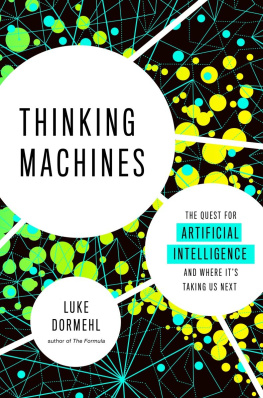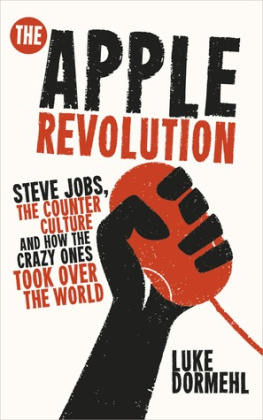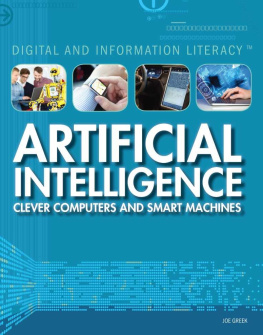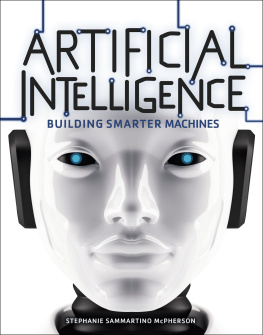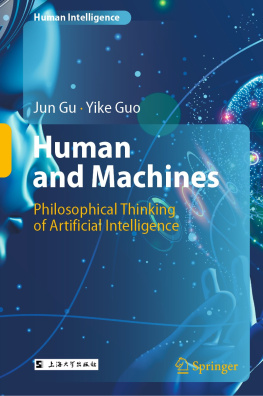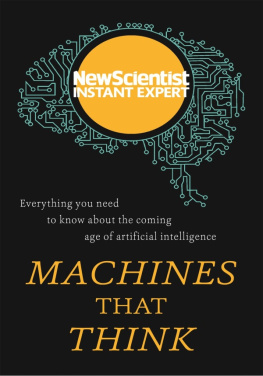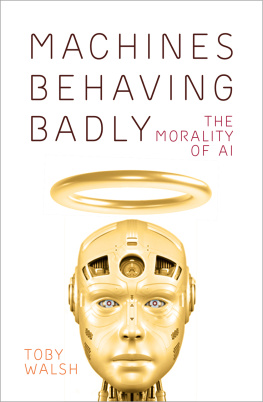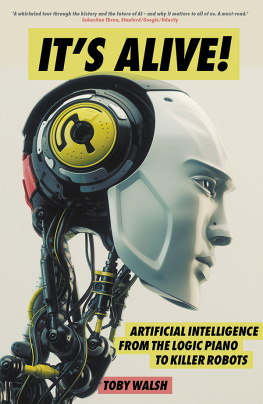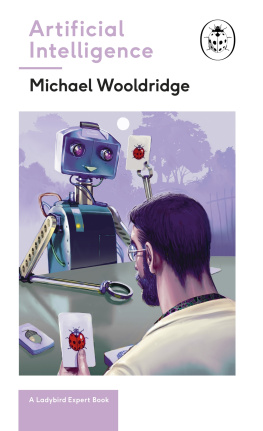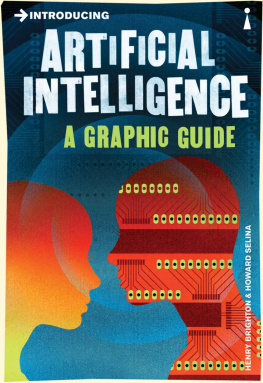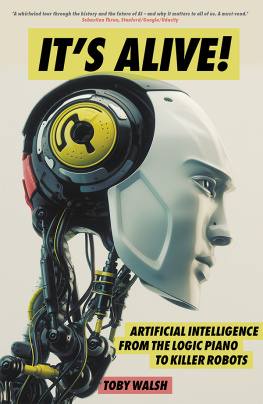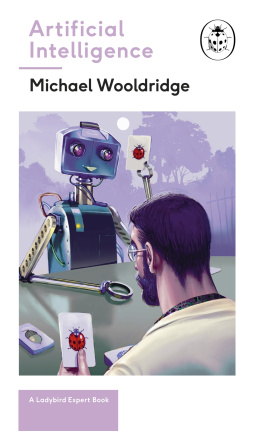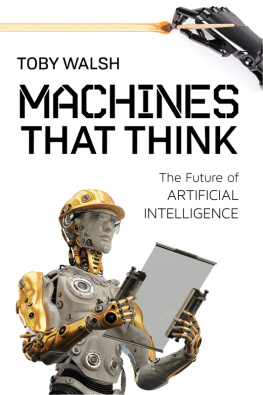
An imprint of Penguin Random House LLC
375 Hudson Street
New York, New York 10014
Copyright 2017 by Luke Dormehl
Penguin supports copyright. Copyright fuels creativity, encourages diverse voices, promotes free speech, and creates a vibrant culture. Thank you for buying an authorized edition of this book and for complying with copyright laws by not reproducing, scanning, or distributing any part of it in any form without permission. You are supporting writers and allowing Penguin to continue to publish books for every reader.
Tarcher and Perigee are registered trademarks, and the colophon is a trademark of Penguin Random House LLC.
Most TarcherPerigee books are available at special quantity discounts for bulk purchase for sales promotions, premiums, fund-raising, and educational needs. Special books or book excerpts also can be created to fit specific needs. For details, write: SpecialMarkets@penguinrandomhouse.com.
L IBRARY OF C ONGRESS C ATALOGING - IN -P UBLICATION D ATA
Names: Dormehl, Luke, author.
Title: Thinking machines : the quest for artificial intelligenceand where its taking us next / Luke Dormehl.
Description: New York : TarcherPerigee, 2017. | Includes bibliographical references and index.
Identifiers: LCCN 2016044018 (print) | LCCN 2016049722 (ebook) | ISBN 9780143130581 (paperback) | ISBN 9781524704414 (ebook)
Subjects: LCSH: Artificial intelligence. | Artificial intelligenceSocial aspects. | BISAC: COMPUTERS /Intelligence (Al) & Semantics. | SCIENCE/Philosophy & Social Aspects. | TECHNOLOGY & ENGINEERING / History.
Classification: LCC TA347.A78 D67 2017 (print) | LCC TA347.A78 (ebook) | DDC 006.309dc23
LC record available at https://lccn.loc.gov/2016044018
While the author has made every effort to provide accurate telephone numbers, Internet addresses, and other contact information at the time of publication, neither the publisher nor the author assumes any responsibility for errors or for changes that occur after publication. Further, the publisher does not have any control over and does not assume any responsibility for author or third-party Web sites or their content.
Cover design: Will Staehle
Cover image: VLADGRIN/Shutterstock
Version_1
To my pal
Alex Millington

CONTENTS

INTRODUCTION
Thinking Machines
THE ALL - SEEING RED eye stares, unblinking. The computer speaks calmly.
Hello, it says. Shall we continue the game?
It is referring to a game of chess you started with it earlier that day. But youre not really in the mood to play. Its not that the computer almost always beats you at chess (although it does). Instead, youre annoyed because it made an inexplicable error concerning the supposed failure of vital bits of important machinery, necessary to ensure your continued survival. No biggie. You checked them out in person and found them to still be in good working order, although the computer insisted they were broken. Now you want answers.
Yes, I know that you found them to be functional, but I can assure you that they were about to fail, the machine says, trying to placate you in the same emotionless monotone it always uses.
You can feel your blood boiling.
Well, thats just not the case, you splutter. The components are perfectly all right. We tested them under 100 percent overload conditions.
Im not questioning your word, but its just not possible, the computer says.
It then adds the six words you know to be true, but are absolutely the last thing you want to hear right now: Im not capable of being wrong.
Movie buffs will instantly recognize this scene from Stanley Kubricks classic sci-fi film, 2001: A Space Odyssey, about a sentient computer that turns murderous and begins attempting to kill off its crew.
For years, this was the way we thought about Artificial Intelligence: as a faintly threatening presence safely shrouded in the context of science fiction.
No more.
Today, the dream of AI has stepped out of cinemas and paperback novels and into reality. Artificial Intelligence can drive cars, trade stocks and shares, learn to carry out complex skills simply by watching YouTube videos, translate across dozens of different languages, recognize human faces with more accuracy than we can, and create original hypotheses to help discover new drugs for curing disease. Thats just the beginning.
Thinking Machines is a book about this journeyand what it means for all of us. En route, we will meet computers pretending to trap pedophiles, dancing robot vacuum cleaners, chess-playing algorithms, and uploaded consciousnesses designed to speak to you from beyond the grave. This is the story of how we imagine our future, and how in a world obsessed with technology, we carve out a role for humanity in the face of accelerating computer intelligence. Its about the nature of creativity, the future of employment, and what happens when all knowledge is data and can be stored electronically. Its about what were trying to do when we make machines smarter than we are, how humans still have the edge (for now), and the question of whether you and I arent thinking machines of a sort as well.
The pioneering British mathematician and computer scientist Alan Turing predicted in 1950 that by the end of the twentieth century, the use of words and general educated opinion will have altered so much that one will be able to speak of machines thinking without expecting to be contradicted.
Like many futurist predictions about technology, he was optimistic in his timelinealthough he wasnt off by too much. In the early part of the twenty-first century, we routinely talk about smart connected technologies and machine learningconcepts that would have seemed bizarre to many people in Turings day.
Now celebrating its sixtieth year as a discipline, Artificial Intelligence is cementing itself as one of mankinds biggest and most ambitious projects: a struggle to build real thinking machines. Technologists are getting closer by the day, and a glimmering tomorrow is fast coming into focus on the horizon.
Thinking Machines is about this dazzling (near) future, the changes that lurk just around the corner, and how they will transform our lives forever.

1
Whatever Happened to Good Old-Fashioned AI?
IT WAS THE first thing people saw as they drew close: a shining, stainless steel globe called the Unisphere, rising a full twelve stories into the air. Around it stood dozens of fountains, jetting streams of crystal-clear water into the skies of Flushing Meadows Corona Park, in New Yorks Queens borough. At various times during the day, a performer wearing a rocket outfit developed by the US military jetted past the giant globeshowing off mans ability to rise above any and all challenges.

